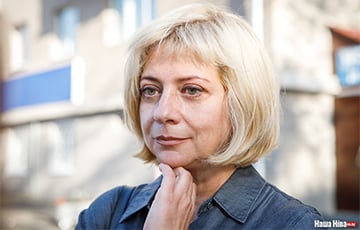Kolkhoz Bloodthirsty Moloch
11- 16.05.2025, 9:38
- 19,962

In memory of Anna, Tamara, Nina.
I was not familiar with Anna Kondratenko. I learned about her life only after her death, strange as it may sound. However, you probably didn't know about her either. It's just that the number of political prisoners, numbering in the thousands, no longer makes it possible to know everyone and remember names. But then, when you find out about their deaths, you still feel ashamed.
After a photo of Anna on a black background and a report that the former political prisoner, having not lived to the age of forty and having spent only six months at liberty, died of cancer detected in the colony, I began to look for any information about her. And I was horrified when I read the testimonies of those who were in the colony with her: Anna had no warm clothes, she did not receive parcels from the outside, because there, on the outside, she had only a retired mother, Anna was behind bars for comments. There are such people - they are loners, they don't need other people's recognition, they don't need likes and handshakes of "you are good, you are cool". They never join the majority, they don't look for support, they don't expect help and approval. They just say what they think and do what they think is right. Judging by the scant information leaked into the information space thanks to the women who sat with Anna Kondratenko, she was exactly like that. Perhaps that's why we didn't know about her: for Anna it was not the public interest that mattered, but her own conscience. She really had nothing to reproach herself with.
Anna, who went to prison for a few harsh words of truth, was not released after a cancer diagnosis. Even in the gulag, there was a concept of "activation." In Gulag language, it was called "early release of prisoners due to a serious incurable illness." Of course, no one would suspect the Gulag executioners of the rudiments of humanism - it was done mainly in order, firstly, not to spoil the statistics with unnecessary deaths in the camps, and secondly, not to waste the state ration on those who would not be of any use at the lumber mill or the mine. But the sick at least had a chance to return home and die in the arms of their relatives - in bed, not in a snowdrift or on the bunk. And some, having found themselves in normal conditions among their relatives, managed to survive.
In our time, thanks to the achievements of science, diseases that in Stalin's time were a death sentence, leave the possibility of living - with a timely start of treatment. And Anna Kondratenko would have had that chance if she had not been kept "until the bell rings" in the colony. As a recently released political prisoner told me, the guards have no need to kill in the literal sense of the word: for this you have to exert yourself, make some movements, invent a legend for reporting - in general, unnecessary hassle. Another thing is not to provide medical assistance to those who need it.
At once the news of Anna Kondratenko's death came another tragic news - former political prisoner Tamara Karavai died of heart failure, having lived after her release from the colony for a little more than six months. Anna Kondratenko was just a little short of 40, Tamara Karawai was 45 - young beautiful women who could have survived if not for the moloch that devoured them.
And today in Warsaw they say goodbye to the artist Nina Margaeva. Nina was not imprisoned, but had to flee Belarus with her child after she signed an open letter by cultural activists against violence and election fraud. While in exile, she became seriously ill. Her disease - amyotrophic lateral sclerosis - is, alas, truly incurable. But if Nina had lived at home, it would have been easier for her. She would have remained among her loved ones, at home, with the support of friends and students of the PLOT art studio, who adored their teacher. Everyone knows that positive emotions can prolong life, while stress, fear, and worry can shorten it and even kill it. How to know, perhaps, if it were not for the need to run into the unknown, the disease would have manifested itself in years, or even decades, and Nina could still live, paint pictures, teach children to draw. Is it possible to say that the experience killed her? Probably.
I am not writing about these women to proclaim "the regime is a murderer" once again - everyone knows about it. I am writing about them so that their names would be heard once again, so that their lives would not become a senseless sacrifice, and so that the names of Anna, Nina, Tamara would certainly be in the new Martyrologist of Belarus. To know, to remember and to speak - this is the minimum that we are obliged to do for them. At least after their death, at least for the sake of their memory.
Irina Khalip, especially for Charter97.org.











